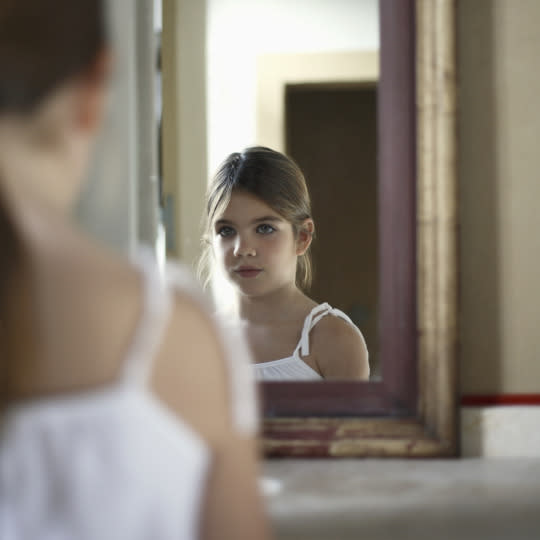The Age Girls Become Self-Conscious About Their Bodies

The average age that Americans first remember feeling self-conscious about their bodies is getting increasingly younger. A new Yahoo Health survey of 1,993 teens and adults ages 13-64 revealed that, on average, Americans say they first remember feeling ashamed of their bodies between 13 and 14 years old.
But with every generation, that self-consciousness strikes at a younger age. In the survey, teens ages 13-17 reported that their first bout of body shame occurred as young as 9 or 10 years old.
STORY: Why Jenna Bush Hager’s Childhood Diary Breaks Her Heart Today
Overall, the biggest drivers of body shame are children’s classmates and the media, from television to social media. Only one in four Americans say their parents contributed to their feeling self-conscious about their bodies.
For the majority (60 percent) of survey responders, that initial experience of body shame was because someone — most often a classmate or friend — made a comment about their physique. Other triggers included seeing a photo of themselves (30 percent), closely followed by comparing themselves to someone they know and trying on clothes (28 percent each).
Although classmates and media depictions of beauty were the biggest influencers on body self-consciousness, for the 25 percent who said their parents contributed to their body shame, that negative parental influence had a powerful effect. Children of body shamers end up being more sensitive and receptive to shame from all other sources.
On the positive side, despite dealing with that self-consciousness growing up, some children of body shamers come out the other side as more emotionally resilient grownups. They are twice as likely to be body-positive as adults compared with children whose parents didn’t shame them. In fact, children of body shamers are helping to drive the body-positive movement, fueled by their own experiences.
STORY: What Happens When Parents Are Obsessed With Their Child’s Weight
But why are people feeling self-conscious at a much younger age? “The younger kids are getting messages earlier about how they should appear,” Robyn Silverman, author of Good Girls Don’t Get Fat: How Weight Obsession Is Messing Up Our Girls and How We Can Help Them Thrive Despite It, tells Yahoo Parenting. Silverman points out that the emphasis on looks is coming from the media, which she notes is pervasive and easily accessible to children and adolescents, along with classmates, friends, and parents. “We’ve also got sexualization happening earlier on,” she says. “Kids feel more hurried to behave [older] and wear adult fashions, and feel that their body needs to look a certain way. All those things taken together are creating a more self-conscious society.”
So what can parents do to help promote a child’s or adolescent’s self-esteem? “Make sure your kids are media-literate,” suggests Silverman. “That means not just sitting with them and talking with them about what they’re seeing, but really being able to dissect it.” Silverman talks to her own children about how advertisers use tricks to make you want to buy what they’re selling, whether it’s a toy, clothing, or a diet. Pointing that out to kids can help them become more media-savvy.
For older children, Silverman says you can show them “before” and “after” photos of their favorite celebrity — namely, what celebrities look like in everyday life, such as leaving the gym, compared to what they look like on the cover of a magazine or in an Instagram shot. It’s teaching adolescents to scrutinize the images they see more closely, and to understand that those images are often digitally manipulated and that makeup and lighting are used to make celebrities appear slimmer and more flawless than they are in real life. “It’s explaining to them that the girl on the cover of the magazine doesn’t even look like the girl on the cover of the magazine,” says Silverman. “It’s puling back the curtain.”
STORY: ‘How I Dressed When I Was 14 vs. How 14-Year-Old Girls Dress Now’
Another crucial step is instituting a “fat talk”-free zone with your family. “Parents need to be very conscious about what they’re saying in front of their kids,” she says. Silverman recommends explaining to family and friends when they come over that your house is a safe haven and that you don’t permit “fat talk” around your children. “If your mother-in-law comes in and talks about dieting, that’s the time to pull her aside and say that the kids may be starting to get hip to this,” says Silverman. “Tell her that you want to make sure everyone leaves fat talk at the door so you can provide the best atmosphere for the children.”
When talking about bodies in front of your children, focus on all the amazing things your body can do, rather than what it looks like, suggests Silverman. “You can say, ‘I love that my body allows me to run on the treadmill and chase after you at the park,’” she says. “‘I love that I got to walk on this beautiful trail with you. I love these legs for allowing me to do that. I have this body that allows me to swim and dance.’”
The same goes for your children, who Silverman says are constantly listening and synthesizing what is being said around them. “Talk to them about the favorite things their body can do, such as playing soccer and getting a goal, or finally being able to do a somersault,” says Silverman. “The more we can talk about what our bodies can do, the less important the pounds are. You’re stretching your concept of what is beautiful.”
Photo: Getty Images
Body-Peace Resolution is Yahoo Health’s January initiative to motivate you to pursue wellness goals that are not vanity-driven, but that strive for more meaningful outcomes. We’re talking strength, mental fitness, self-acceptance — true and total body peace. Our big hope: This month of resolutions will inspire a body-peace revolution. Want to join us? Start by sharing your own body-positive moments on social media using the hashtag #bodypeaceresolution.


